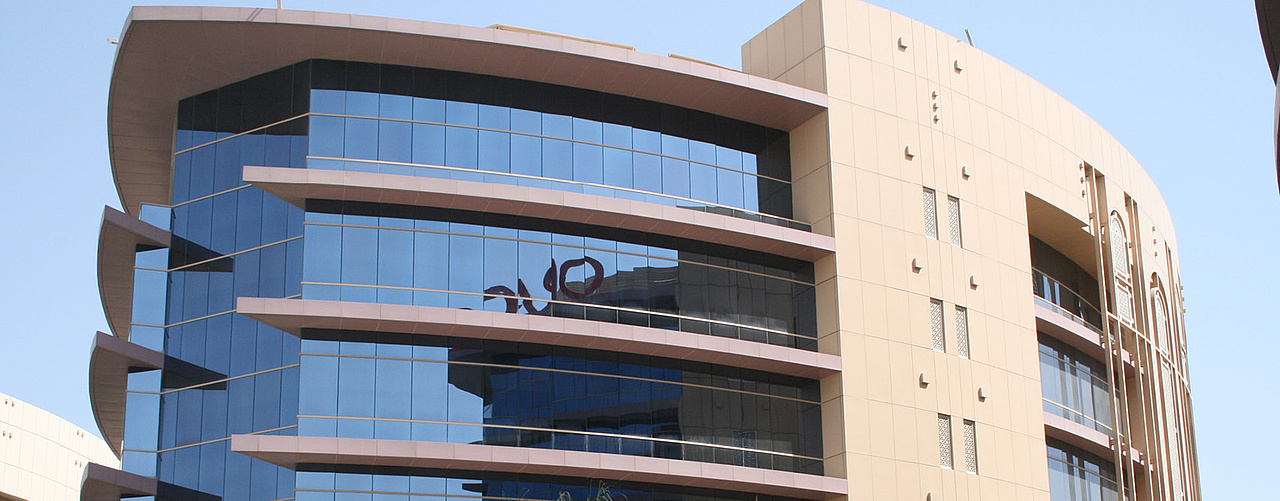
THE ART OF BEING LOCAL
IN MIDDLE EAST
Company formation in the United Arab Emirates (UAE)
The United Arab Emirates (UAE) has developed into a major business location in recent decades. The country attracts business people and investors from all over the world. The entrepreneur- and investor-friendly overall location on the Persian Gulf, a liberal business environment and attractive tax advantages make the UAE a preferred destination for business start-ups. The right contact for your market entry into the UAE, be it as your own company or a branch office, is InterGest Middle East. The consultancy firm was founded in 2004 to help foreign companies plan and realise a business base in the United Arab Emirates.
Holger Ochs has headed InterGest Middle East as Managing Director for the Middle East region since 2006. After studying economics and working for several years in various tax and consulting companies in Europe, Holger Ochs has now been active for more than two decades in supporting international companies and investors expanding their business activities in the Middle East and the United Arab Emirates in particular. Holger Ochs speaks fluent German and English.
WHY SHOULD
COMPANIES
INVEST IN the
United Arab Emirates (UAE)?
Follow our series
(Video in German)
What should you look out for in advance when setting up a company in the UAE?
1. Comprehensive market research:
Before you decide to set up a company in the UAE, thorough market research is crucial. Investigate the target market, the competitive situation, the demand for your products or services, and the legal and regulatory framework. A solid knowledge of the market will help you make strategic decisions and maximise your company's chances of success.
2. Choice of company location:
The UAE offers several emirates as locations for your business start-up. Dubai, Abu Dhabi and Sharjah are popular options, but other emirates such as Ras Al Khaimah also offer attractive opportunities. Each emirate has its own advantages and industries. In each sub-emirate, there are a number of so-called 'free zones' (industrial zones) for foreign investors to choose from. Make sure that the location suits your business and offers you advantages such as good access to customers, infrastructure and skilled labour.
3. Legal form of the company:
The UAE offers foreign investors several options to set up a company (in the legal form of Limited Liability Company, LLC), including Free Zone companies, Mainland companies and Offshore companies. Each legal form has its own specific features and requirements. Free Zone companies offer 100% foreign ownership, tax advantages and ease of business formation. Mainland companies allow access to the local market, but in some cases still require a local co-partner. Offshore companies are suitable for international business, as well as real estate and asset management. Consult a specialised advisor to choose the appropriate option and legal form for your business.
4. Legal Basis:
Complying with legal requirements is an important step in setting up a company in the UAE. This includes registering the company name, obtaining the necessary permits and licences, and meeting legal and regulatory requirements (compliance). Work with experienced consultancies to ensure that all legal aspects are properly met.
5. Cultural specifics:
When setting up a business in the UAE, it is important to respect cultural customs and practices. Arabic is officially the official language, but in fact communication is mainly in English. Business relationships are often based on personal relationships and networks, so it is beneficial to involve local partners or advisors to make business activities successful.
6. Business license:
A business licence is required to set up a business in the UAE. Depending on the type of business and location, different types of licences may be required, such as a commercial licence, production licence or service licence. It is important to familiarise yourself with the requirements and regulations in advance and to prepare all the necessary documents at an early stage.
This is where you can get professional support from InterGest Middle East. The company specialises in supporting international companies in the establishment and long-term administration of foreign companies. This means: The expanding company is supported by InterGest in all administrative requirements and can thus fully concentrate on the operative core business, e.g. customer acquisition and distribution of its products in new markets.
What are the advantages of setting up a company in the United Arab Emirates?
Incorporating a company in the UAE offers a number of benefits that can help increase the success and profitability of your business. Here are some of the most important advantages:
- Strategic location: the UAE is at the crossroads of Europe, Asia and Africa. This geographical location makes it an ideal hub for trade between these regions. Access to key international markets is facilitated, expanding your business opportunities and making it easier to export and import.
- Growing economy: The UAE has a robust economy with above-average growth in economic sectors such as energy, finance, tourism, logistics, construction and technology. This provides opportunities for business growth and success.
- Business-friendly environment: The UAE government stands for business-friendly policies to boost the economy and attract foreign investment. There is an efficient bureaucracy that simplifies start-up processes, facilitates quick company registrations and supports investors.
- Support from local authorities: In the UAE, local authorities provide extensive services for businesses, including fast company registration, efficient licensing procedures and access to infrastructure facilities. Government agencies such as the Dubai Chamber of Commerce and the Abu Dhabi Department of Economic Development provide advice and information.
- Tax advantages: The UAE offers many tax advantages. There is still no income tax or capital gains tax in most free zones. Corporate income tax is a moderate 9%, plus there are extensive tax breaks for small and medium sized companies. This allows companies to maximise profits and use more capital for growth and expansion.
- Infrastructure and services: The UAE has a state-of-the-art infrastructure with world-class business centres, communication networks, airports and seaports. There is also a wide range of business support services.
- Access to human resources: The UAE offers a diverse human resource structure, including a highly skilled workforce. The country attracts professionals from all over the world. This enables businesses to hire talented employees with international experience and drive growth.
- Business opportunities: The UAE offers a wide range of business options in various sectors. The advanced economy and growing consumer segment increase opportunities for companies to market their products and services and attract new customers.
The advantages of doing business in the UAE can vary depending on the type of company, location and individual business objectives. A thorough, early market analysis and expert advice is recommended to determine the specific benefits for your business in a very concrete way. InterGest Middle East can help you find the right entry point into the UAE market environment as well as the Gulf region as a whole. Clients of InterGest Middle East receive a flexible management solution as a service, including legal, financial strategy, accounting and fiscal support.
What are the risks of setting up a company in the United Arab Emirates?
Of course, there are also potential risks and challenges to consider when entering the UAE market:
- Local Regulations and laws: The UAE has specific regulations and laws that need to be complied with when setting up a company and running its business. These regulations may vary depending on the emirate and the type of business. It is important to thoroughly research local regulations and ensure that all legal requirements are met.
- Domestic participation: For some types of companies such as the Limited Liability Company (LLC) in the territory (mainland), domestic participation is still required in certain industries and sectors of the economy. In these (exceptional) cases, the domestic partner holds at least 51% of the shares, while the foreign investor can own a maximum of 49%. These restrictions on ownership structure can have an impact on entrepreneurial control and decision-making.
- Cultural differences: The UAE has a different culture, customs and business practices than many Western countries. It is important to familiarise yourself with local business etiquette and demonstrate cultural sensitivity in order to build effective business relationships.
- Competition: The UAE is a highly competitive market with many international and local companies. Depending on the industry and market segment, competition can be intense - especially with Asian and Indian companies. A careful competitive analysis and a differentiated business strategy are therefore important to position oneself successfully in the market.
- Dependence on sponsors and partners: In certain company forms such as the LLC on the national territory (mainland), a domestic sponsor or partner is still required in individual cases. Choosing a trustworthy and reliable sponsor is crucial to ensure a long-term business relationship and avoid potential conflicts.
- Economic fluctuations: Like any economy, the UAE economy is prone to fluctuations. Changes in the global oil price, political events or global economic uncertainties can affect business conditions in the UAE. It is important to prepare for economic challenges and issues.
Therefore, before setting up a business in the UAE, it is advisable to thoroughly research the current business environment, challenges and risks, conduct thorough due diligence and seek the assistance of an experienced advisor if necessary. Good preparation and a sound understanding of the local business environment can help minimise risks and increase success. Working with InterGest Middle East makes it easier for you to understand the UAE market and take advantage of its unique characteristics. We can provide administrative services, recruitment, payroll, contract review, negotiation, legal and tax advice, invoicing and dunning, and sales development.
What types of companies are there in the United Arab Emirates?
The UAE offers entrepreneurs different options for setting up a company. The two most important options are the Mainland Company (on the territory of the UAE) and the Freezone Company (in one of the approximately 45 free zones). The difference lies in the radius of operation: a Mainland Company has its registered office within the country; a Freezone Company, on the other hand, allows the entrepreneur the tax advantages in Dubai, but does not provide for direct business relations within the UAE. In detail, one of the two variants can be found in each of the following company forms:
- Limited liability company (LLC): The LLC on the territory of the UAE is a popular form of company in the UAE. It enables foreign investors to establish a company on the territory of the country. Today, it is usually possible to set up a company without a local co-shareholder, i.e. '100% foreign ownership'. In individual cases (depending on the specific business activity) a local partner (co-partner/sponsor) must be involved. In this (individual) case, the foreign investor can only hold up to 49% of the company shares. This form of company is suitable for enterprises that wish to operate locally on the national territory (e.g. in the context of construction projects) in order to benefit from local market opportunities.
- Free Zone Company: The establishment of a Free Zone Company in one of the approximately 45 business locations enables foreign investors to hold 100 % of the company shares. The Free Zones (including Jafza, Dafza, DIFC or RAKEZ) are specifically designed for certain industries and business activities and offer tax advantages as well as a simple incorporation procedure. Each Free Zone has its own rules and regulations, some of which differ from each other.
- Offshore Company: an offshore company is a popular option for companies that want to conduct international business and manage real estate or other assets, among other things. This type of company offers tax advantages, but is generally not allowed to do business in the local UAE market.
- Joint venture: a joint venture is a collaboration between a foreign company and a local partner or company. This form of partnership allows both players to benefit from their respective strengths and resources. The sharing of profits and risks is determined in a joint agreement.
The exact rules and requirements for the international investor are different for each type of company. It is recommended to seek professional advice to select the best corporate form for your business in the UAE. InterGest Middle East has the necessary expertise to facilitate your company formation in the Emirates. We offer market entry advice, company formation, fiduciary management, administrative support (compliance), legal advice (labour law, company law, tax law, real estate law, etc.), bookkeeping and accounting, import, export and administrative work, processing of residence permits (visas) and much more. Let specialists advise you.
Bet on the future for your expansion! Put your money on the United Arab Emirates!
Due to its economic dynamism and the development of an infrastructure that is unique in the Arab region, the UAE has become an interesting sales market for foreign companies as well as a cost-effective location for business start-ups in the last decade. The UAE represents a young society by international standards with a high demand for education, services, consumer and investment goods. A stable national budget, secured by oil revenues and therefore largely independent of tax revenues and other levies, guarantees the Emirates solid growth for all parts of the emirate. Ideal working conditions, good living conditions, a high standard of living, a modern medical care system and a well-developed school and training system represent solid framework conditions for expanding companies to ensure the attractiveness of the UAE as a business location also in the future.
InterGest Middle East is located in Dubai Internet City, one of the most important free trade zones in the Arab region. We offer interested parties the complete range of services for setting up a foreign company or branch office - from payroll, business process outsourcing, accounting and ongoing tax and legal advice to the day-to-day management of administrative tasks. We are the competent partner for the administrative support of your company in the UAE. Contact us!






